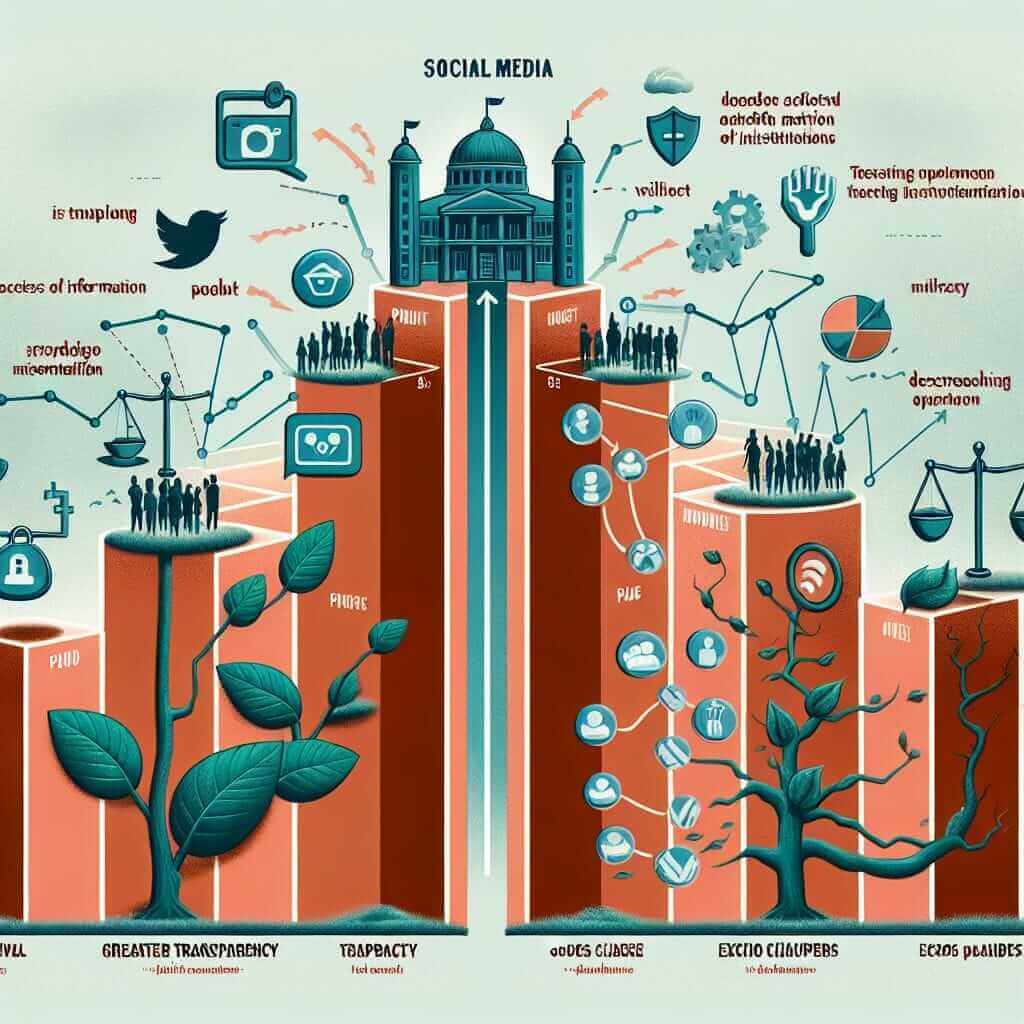The IELTS Reading section can be daunting for many candidates. One popular topic that often appears in many forms is the societal influence of social media. Today, we focus on “How does social media impact public trust in institutions?” This is a relevant and common subject, often addressed in past exams, making it a perfect candidate for your preparation.
Reading Passage and Questions
For today’s practice, we will approach this topic with a text categorized as a Medium Text level, similar to what you’d find in an actual IELTS exam. Prepare to answer various types of questions including Multiple Choice, True/False/Not Given, and Sentence Completion.
The Impact of Social Media on Public Trust in Institutions
In recent years, social media has dramatically transformed how information is disseminated and consumed. Platforms such as Facebook, Twitter, and Instagram have not only revolutionized communication but have also impacted public trust in institutions such as governments, healthcare systems, and news media.
One significant effect of social media is the immediate and often overwhelming spread of information, both accurate and inaccurate. Misinformation and “fake news” have become rampant, leading to widespread confusion and skepticism among the public. For example, during the COVID-19 pandemic, various misleading theories about the virus’s origin, spread, and treatment circulated widely, undermining public trust in health advisories from reputable organizations like the WHO and CDC.
Moreover, social media has allowed for the amplification of voices that traditionally may not have been heard. This democratization of information can be a double-edged sword. While it promotes freedom of expression and gives marginalized communities a platform, it also means that unverified and sensationalist content can gain traction quickly. As a result, trust in traditional authoritative institutions is eroded when competing narratives are perpetuated.
Political institutions are not immune to these dynamics. The impact of social media on elections is particularly profound. Politicians and their supporters use social media campaigns to reach voters directly, bypassing traditional media channels. While this can increase engagement and participation, it also allows for the spread of political misinformation. Instances of alleged electoral interference through social media campaigns further exacerbate public distrust.
Interestingly, social media can also be leveraged to rebuild trust. Transparent communication and factual updates via social media can help institutions connect more directly with the public. For example, health agencies using social media to share real-time data and respond to queries can foster trust and accountability.
In conclusion, while social media has considerable potential to enhance communication and democratize information, its role in spreading misinformation poses severe challenges to public trust in institutions. Balancing these aspects requires a nuanced approach by both social media users and institutional authorities.
Questions
Multiple Choice
-
What is one effect of the pandemic-related misinformation shared on social media?
- A) Increased trust in governmental advisories
- B) Decreased trust in health advisories
- C) Stability of public trust
- D) No significant impact
-
How can social media help in rebuilding trust in institutions?
- A) By allowing unverified information to spread
- B) By promoting freedom of expression only
- C) By enabling transparent and factual communication
- D) By silencing marginalized communities
-
What is the double-edged nature of social media’s democratization of information?
- A) It increases authoritative control
- B) It only spreads verified facts
- C) It promotes freedom of expression and spreads unverified content
- D) It diminishes public engagement
True/False/Not Given
- Social media has no effect on political campaigns.
- All information on social media is verified and accurate.
- Social media can help institutions share real-time data.
Sentence Completion
- Instances of ____ through social media campaigns further exacerbate public distrust.
- Social media allows for the amplification of ____ that traditionally may not have been heard.

Answer Keys
Multiple Choice
- B) Decreased trust in health advisories
- C) By enabling transparent and factual communication
- C) It promotes freedom of expression and spreads unverified content
True/False/Not Given
- False
- False
- True
Sentence Completion
- electoral interference
- voices
Common Mistakes
- Overlooking key details: Many students miss significant points by skimming through the text too quickly. Always read the passage thoroughly.
- Misinterpreting questions: Understand what the question asks. Misinterpreting can lead to incorrect answers.
- Poor time management: Allocate time for each question and avoid getting stuck on difficult ones.
Vocabulary
- Disseminated (v) | /dɪˈsɛmɪneɪt/ | spread widely
- Skepticism (n) | /ˈskɛptɪsɪz(ə)m/ | doubt as to the truth of something
- Amplification (n) | /ˌæmplɪfɪˈkeɪʃən/ | the act of increasing magnification
- Democratization (n) | /dɪˌmɒkrətɪˈzeɪʃən/ | the action of making something accessible to everyone
- Misinformation (n) | /ˌmɪs.ɪn.fərˈmeɪ.ʃən/ | false or inaccurate information
Grammar Focus
- Relative Clauses:
- Example: Platforms such as Facebook, Twitter, and Instagram have democratized information that traditionally may not have been accessible.
- Passive Voice:
- Example: Information is being disseminated and amplified across social media.
Tips for High Reading Scores
- Enhance Vocabulary: Regularly practice and learn new words.
- Practice Skimming and Scanning: Improve your ability to quickly locate information.
- Understand Question Types: Familiarize yourself with different types of questions and practice answering them.
- Time Management: Practice under timed conditions to improve your pace.
By focusing on the areas above, you’ll improve your chances of achieving a high score in the IELTS Reading section. Keep practicing and stay consistent with your efforts. Good luck!